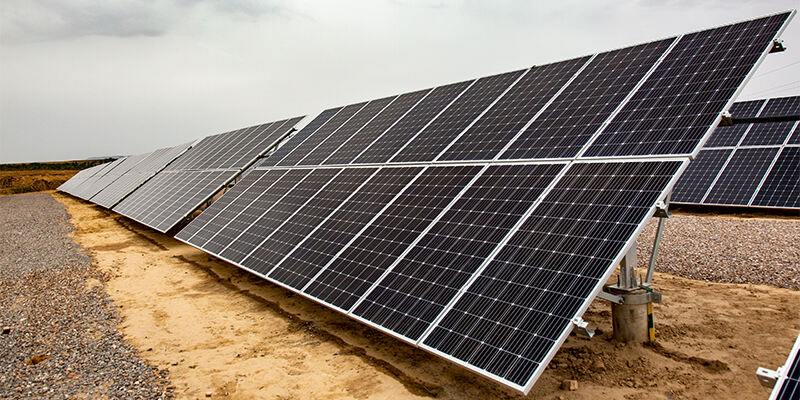Penerapan Alumunium dalam Industri Energi Baru

Alumunium memiliki peran penting dalam industri energi baru, yang mencakup sumber energi terbarukan seperti surya, angin, dan air, serta solusi penyimpanan energi seperti baterai. Sifat uniknya, termasuk ringan, kuat tinggi, tahan korosi yang baik, dan dapat didaur ulang, membuat alumunium menjadi pilihan ideal untuk berbagai aplikasi di sektor ini yang berkembang pesat. Artikel ini menjelajahi penggunaan beragam alumunium dalam industri energi baru dan manfaatnya yang signifikan.
Di sektor energi surya, alumunium digunakan secara luas dalam pembuatan panel surya dan struktur penopang. Aplikasi utama meliputi:
Bingkai Panel Surya: Bingkai aluminium memberikan dukungan struktural untuk panel surya, melindunginya dari elemen lingkungan sambil tetap ringan dan tahan korosi. Hal ini meningkatkan efisiensi dan umur panjang keseluruhan instalasi surya.

Sistem Pemasangan: Paduan aluminium digunakan dalam desain sistem pemasangan yang menahan panel surya. Kekuatannya dan karakteristik ringan memungkinkan pemasangan dan penyesuaian yang mudah, mengoptimalkan paparan sinar matahari.
Paduan aluminium semakin banyak digunakan di sektor energi angin, terutama dalam konstruksi turbin angin. Aplikasinya mencakup:
Menara Turbin: Paduan aluminium dapat digunakan dalam pembuatan menara turbin, memberikan solusi yang ringan namun kuat yang membantu mengurangi berat keseluruhan struktur turbin. Ini dapat menghasilkan biaya transportasi dan pemasangan yang lebih rendah.
Baling-baling dan Komponen: Penggunaan paduan aluminium dalam baling-baling turbin dan komponen lainnya membantu meningkatkan kinerja dan efisiensi. Rasio kekuatan-terhadap-berat yang sangat baik memungkinkan pembuatan baling-baling yang lebih panjang, yang dapat menangkap lebih banyak energi angin.

Paduan aluminium juga berperan penting dalam teknologi penyimpanan energi, terutama dalam pembuatan baterai. Aplikasi utamanya meliputi:
Casing Baterai: Aluminium sering digunakan untuk casing baterai karena sifatnya yang ringan dan konduktivitas termal yang baik. Ini membantu mengelola panas selama siklus pengisian dan pembebanan, meningkatkan kinerja baterai.
Struktur Pendukung: Paduan aluminium memberikan dukungan struktural untuk sistem baterai, memastikan ketahanan dan keselamatan sambil meminimalkan berat.
Kemunculan kendaraan listrik telah meningkatkan permintaan akan material yang ringan, dan paduan aluminium adalah pilihan populer. Aplikasi mereka dalam EV meliputi:
Chasis dan Panel Bodi: Paduan aluminium digunakan dalam konstruksi chasis dan panel bodi EV, memberikan penghematan berat yang signifikan. Hal ini menghasilkan efisiensi energi yang lebih baik dan jangkauan berkendara yang lebih jauh.
Paket Baterai: Perumahan aluminium ringan sering kali digunakan untuk paket baterai, memberikan perlindungan sambil mengurangi berat keseluruhan kendaraan.
Aluminium sangat dapat didaur ulang, sejalan dengan fokus industri energi baru pada keberlanjutan. Menggunakan aluminium daur ulang memerlukan energi yang jauh lebih sedikit dibandingkan produksi aluminium primer, mengurangi jejak karbon keseluruhan dari sistem energi. Aspek keberlanjutan ini semakin penting saat industri beralih ke praktik yang lebih ramah lingkungan.
Penerapan paduan aluminium dalam industri energi baru menunjukkan fleksibilitas dan efektivitasnya dalam meningkatkan kinerja, efisiensi, dan keberlanjutan. Dari panel surya dan turbin angin hingga solusi penyimpanan energi dan kendaraan listrik, paduan aluminium memberikan solusi inovatif yang memenuhi permintaan sistem energi modern. Seiring pertumbuhan sektor energi baru, penggunaan paduan aluminium akan semakin berperan penting dalam mendorong perkembangan dan pencapaian tujuan keberlanjutan.